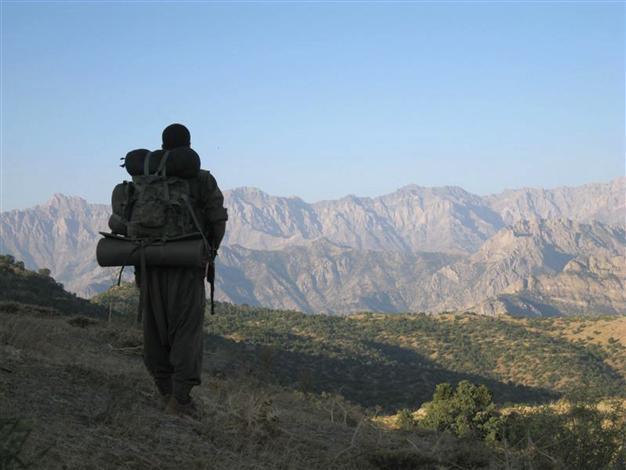Government keeps an eye on PKK pullout, says Turkish deputy PM
ANKARA - Hürriyet Daily News

This handout photo released by the Firat New Agency shows members of the outlawed Kurdistan Workers' Party (PKK) starting their withdrawal from Turkish soil. AFP PHOTO/FIRAT NEWS AGENCY/STR
Governmental officials in Ankara are following, from a distance, the withdrawal of members of the outlawed Kurdistan Workers’ Party (PKK) from Turkey into neighboring Iraq, which officially started May 8 as part of the ongoing peace process. At the same time, pro-Kurdish lawmakers in eastern and southeastern provinces cautioned over potential sabotages against the moves, which could eventually be a significant step to ending the three-decade long conflict that has claimed the lives of tens of thousands of people.
“It is hard to say with precision what is happening and at what time. On this issue, Kandil may have its own calendar and dates set,” Deputy Prime Minister Bülent Arınç said, in response to questions from reporters. Kandil is a byword used for the PKK headquarters based in the Kandil Mountains of northern Iraq.
“What matters to us is the result, and it looks like we are getting there,” Arınç added, noting that the National Intelligence Organization (MİT) had been closely following the implementation of the PKK’s announced decisions.
The PKK declared a cease-fire in March and promised to gradually pull fighters out of Turkey as part of the government-led peace talks aimed at ending the costly conflict. The group has been fighting Turkey for autonomy for Kurds in southeastern Turkey.
“We know that they have started moving,” Peace and Democracy Party (BDP) co-leader Selahattin Demirtaş told Agence France-Presse (AFP). “They prefer to move at night and stay out of sight in the daytime,” he added, referring to militants’ attempts to avoid tension as well as publicity that might jeopardize their security,
The BDP, whose deputies have been closely involved in the ongoing process, has warned about “dire consequences” in the event of any intervention or harm coming to militants.
“We are living a historic process, historic days. May 8 is a very important and meaningful day for us ... A day on which a conflict process ends and a new process starts,” BDP deputy parliamentary group chair Pervin Buldan told reporters in Erzurum.
“Today, we will go to a village to stage a sit-in and be on guard duty. Because we don’t want any operations or interventions to take place. If an intervention takes place and an operation is launched, the process will be troubled.”
Calls for patience
Speaking at a rally held in the town of Erciş in the eastern border province of Van, independent deputy Aysel Tuğluk vowed to be patient, dedicated and sacrificing for the sake of the process, but also noted her awareness of the potential grave difficulties ahead.
PKK militants are withdrawing in order to give peace a chance, so none of them should be hurt even as much as a nosebleed, said Tuğluk, the co-chair of the Kurdish-umbrella organization Democratic Society Congress (DTK).
In Ankara, in response to questions from reporters as he held a press conference at the Parliament, İdris Baluken, another deputy parliamentary group chair of the BDP, said the withdrawal might take from three to five months, taking into consideration the group’s retreat style and geographical conditions.
Meanwhile, ruling Justice and Development Party (AKP) Deputy Chair Hüseyin Çelik dismissed concerns over the course of the process: “The process is running in a way that allows no room for concern.”
Nevertheless, also in Ankara, the Great Unity Party (BBP) leader Mustafa Destici, a minor right-wing party that is not represented at the Parliament, held a lengthy meeting with Prime Minister Recep Tayyip Erdoğan, during which he said he explained his concerns over whether this process would eventually end terror.
A parliamentary commission formedMeanwhile, a parliamentary investigation commission set to monitor the ongoing process was eventually formed on May 8. The commission which would be composed of 10 deputies from the ruling Justice and Development Party (AKP) and one deputy from the Peace and Democracy Party (BDP) was set to hold its first meeting late May 8. Both the main opposition Republican People’s Party (CHP) and the Nationalist Movement Party (MHP) refused to assign deputies as members to the commission.
